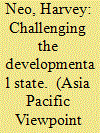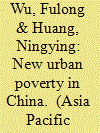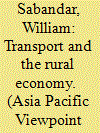| Srl | Item |
| 1 |
ID:
078478


|
|
|
|
|
| Publication |
2007.
|
| Summary/Abstract |
Nature conservation efforts are often reactive to encroaching development plans and systematic conservation planning that is integral with development is not only uncommon, but is often fraught with difficulties even where it is actually attempted. Such obstacles to conservation are especially apparent in developmental states where state legitimacy is largely derived from the state's ability to develop the country. Among other things, developmental states place a premium on physical and economic development. This paper critiques, through the standpoint of nature conservation, the inadequate conceptualisation of `development' in the developmental state thesis. Specifically, this paper argues that the seemingly value-free (but ultimately economically based) underpinnings of development goals pushed by the developmental state needs to be tempered with a broader concern for the ethics of development. To that end, I draw on two case studies of nature conservation tussles in Singapore to show how alternative extra-economic visions of development have been articulated, notwithstanding the developmental state's monopoly on the discourse (and practice) of progress and development. The case studies, set in the heady economic growth of the early 1990s, will critique two related aspects of the developmental state: its `amoral' economistic conception of development and its use of growth and materialism as legitimacy
|
|
|
|
|
|
|
|
|
|
|
|
|
|
|
|
| 2 |
ID:
078481


|
|
|
|
|
| Publication |
2007.
|
| Summary/Abstract |
China's urban land reform is a gradualist process of transforming a planned land allocation system to an open land market system, while the ownership of the land remains under the control of the state. This process defines the relationships between local government and emerging non-public interest groups in the land development process. These issues can be most clearly seen in the State-Approved Development Zones, where municipalities have been encouraged to promote economic development and test out land policy initiatives. Using the institutionalist and urban growth machine analytical approaches to land development processes, this study examines the operation of development processes and the role of local government and its relationship with other interest groups. By employing a case study research strategy, focused upon the Hangzhou High-Technology Zone, the study uncovered a local government-led growth coalition which featured participation by other interest groups and revealed the applicability and variations when applying two strands of theories to a socialist economy in transition. Besides the land reform policy implications drawn from the case study evidence, the study concludes that the presence of interest groups and the missing community organisations unique to China give new theoretical implications and that both theories work much better with the economic domain than with the political domain largely because of a lagged political reform
|
|
|
|
|
|
|
|
|
|
|
|
|
|
|
|
| 3 |
ID:
078477


|
|
|
|
|
| Publication |
2007.
|
| Summary/Abstract |
This paper examines the new urban poverty in China since the deepening of market-oriented reform in the 1990s and argues that the institutional process goes beyond recent market-oriented reforms. Poverty generation is driven by broad economic restructuring and transformation of welfare provision. De-industrialisation and decline in state-owned enterprises have generated a significant number of laid-off workers, forming the new urban poor who are simultaneously confronted with the transformation of welfare provision. The loss of workplace-based entitlement is a direct cause of their poverty or exacerbates their underprivileged conditions. For at least a significant proportion of new urban poor without the hope of returning to the mainstream labour market, the minimum living standard support programme in fact captures them at the edge of survival
|
|
|
|
|
|
|
|
|
|
|
|
|
|
|
|
| 4 |
ID:
078475


|
|
|
|
|
| Publication |
2007.
|
| Summary/Abstract |
Transnationalism needs to be understood as a set of practices fashioned through the life course as well as in relation to contextual factors that include state policy and experiences of discrimination that affect entry to the labour force. The paradox of transnationalism is that families make strategic decisions to separate in order to maintain family unity and to advance the welfare of children. Emigrants from Hong Kong to Canada in the latter decades of the twentieth century were motivated by concern for family welfare and the quality of education in Canada. Yet economic livelihood prospects remained greater in Hong Kong than in Canada, prompting many families to become transnational `astronaut' families with one or more members working in Hong Kong. Migration decisions tend to occur around key points of life-course transition involving entry to and graduation from education, and entry to and exit from the labour force. Transnational practices are complex and multigenerational, involving different patterns for young adults, those in their middle years and the elderly.
|
|
|
|
|
|
|
|
|
|
|
|
|
|
|
|
| 5 |
ID:
078480


|
|
|
|
|
| Publication |
2007.
|
| Summary/Abstract |
This paper is concerned with the interaction between transport improvements and the rural economy. An institutional approach, based primarily on the new institutionalism theory, was used as the theoretical basis for the analysis. Using the evidence from Ambeso Village of Tana Toraja District, Indonesia, the paper examines the way transport improvements have been introduced and provided opportunities for positive change as well as individual responses to these opportunities. The paper ends by emphasising the role of institutions in the interaction between transport and the rural economy and the need for transport policy and research to transcend its traditional boundaries and address the complexities of institutions and institutional change.
|
|
|
|
|
|
|
|
|
|
|
|
|
|
|
|
| 6 |
ID:
078482


|
|
|